The UN now has a well-oiled and well-funded digital influence campaign to promote its causes. The UN is a gargantuan "peace-keeping" agency that receives massive funding from the U.S. According to the Council on Foreign Relations, the United States "remains the largest donor to the United Nations. Its initiatives ensure its ideological messaging is "properly articulated" and will rally unsuspecting public opinion around its missions. The UN is waging war with the "infodemic" of mis-, dis-, and malinformation.
UncoverDC has reported extensively on the U.S. government's development of mis-, dis-, and mal-information social media campaigns and its partnership with Big Tech. These ideologically-driven influence campaigns have often flown under the radar. More importantly, in many cases, they are shifting public opinion and protecting government interests.
The UN Says There is an Infodemic: Mis-, and Disinformation Threaten Public Health
The UN has also invested significant resources into programs that filter information in service of its ideological worldview. Biased programming that targets mis- and disinformation continues to be a contagion that has seeped into almost every crack and crevice of our information world. The efforts have resulted in a virtual information lockdown, with elite capture and control of the "facts," data, and conversations "they" want us to see, hear, and digest. It is full-scale Orwellian and only getting worse.
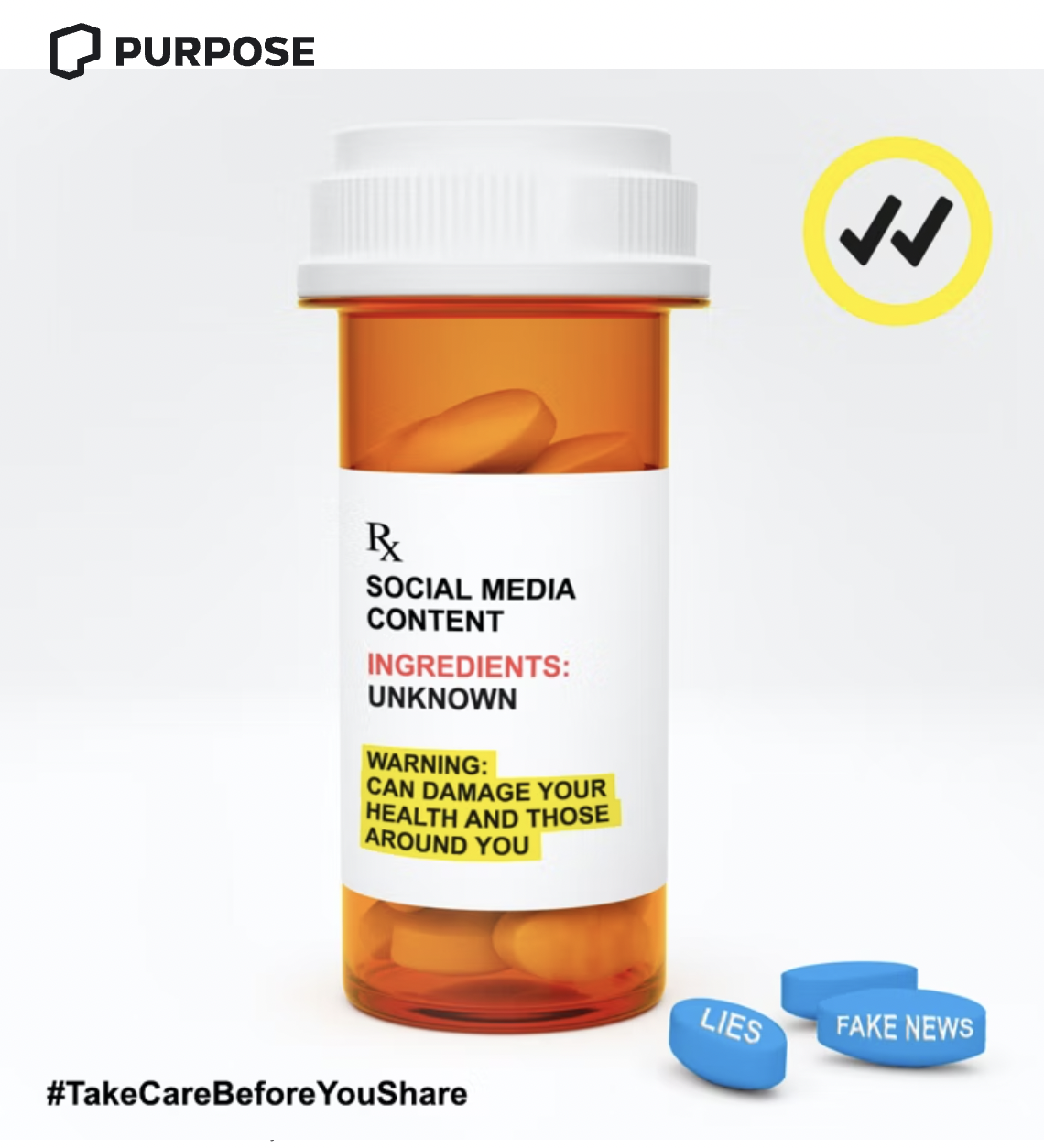 Take Care Before You Share/https://www.purpose.com/case_studies/verified/
Take Care Before You Share/https://www.purpose.com/case_studies/verified/
Many statements were made early on in the pandemic by UN leaders about the "infodemic" or the acceleration of the "misinformation and disinformation pandemic" that allegedly threatened "public health." The concern was that the public was poorly informed by errant and uncooperative digital content on a variety of health-related policies such as masking, vaccines, and social distancing because of rampant misinformation. As a result, the UN developed a number of initiatives to set the record straight, at least according to its way of framing it, on issues related to COVID-19.
It is naive, however, to think that these UN initiatives were or would be limited to the subject of COVID-19. In fact, the UN has expanded avenues to control information related to its philosophical and ideological mission. Climate change, equity, root causes of poverty, and hunger are among its championed causes. And the organization has assembled an "army of "information volunteers who are willing to help spread trusted content" that conforms with the UN's ideological stance. The UN's global partnership initiatives are all a part of its 2030 Agenda to promote Global Solidarity and sustainable development worldwide.
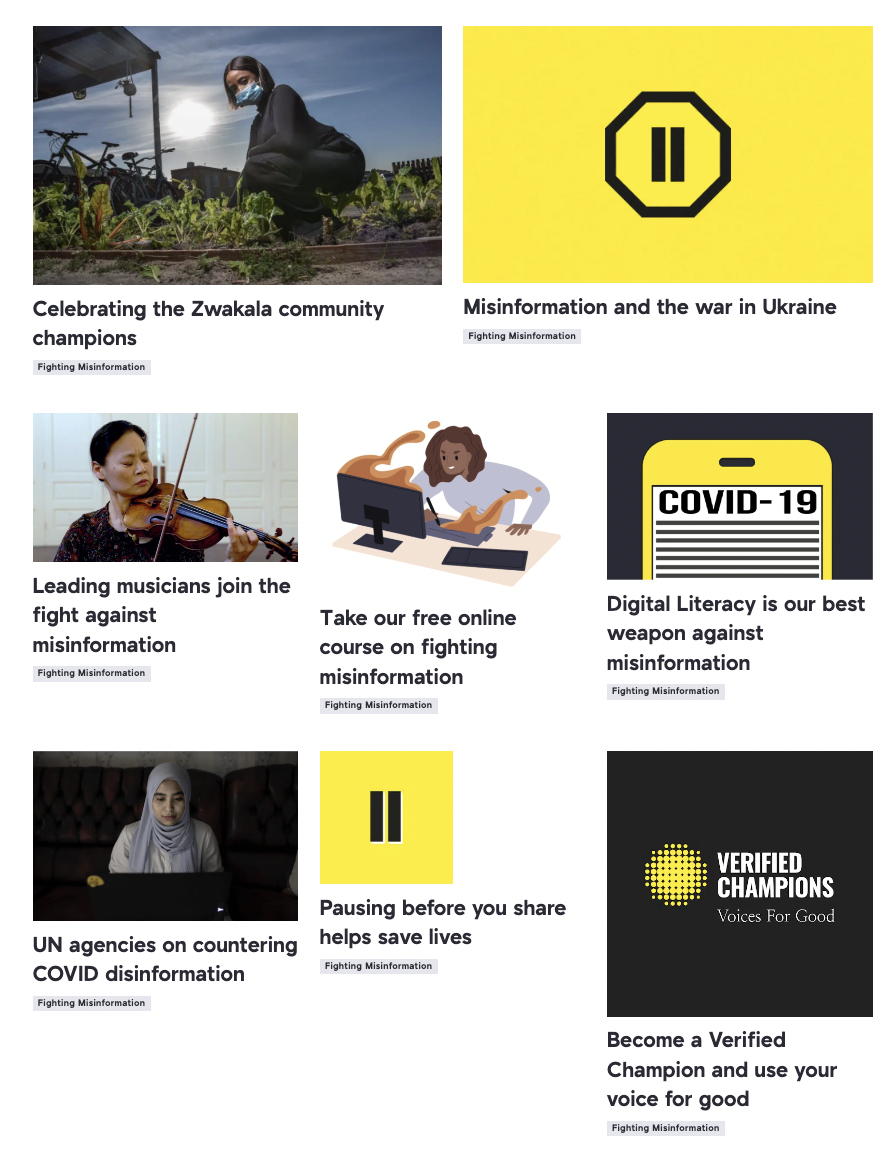 Verified/fighting misinformation
Verified/fighting misinformation
The Verified Campaign: A Social Media Toolkit to Combat Disinformation
United Nations Under-Secretary-General for Global Communications, Melissa Fleming, briefed journalists in May 2020 on the importance of the "Verified" initiative as a way to combat misinformation. Her aim was to deploy its "information volunteers" to "flood digital space with the facts amid the COVID-19 crisis." She also foreshadowed the use of the Verified initiative for future social justice and climate initiatives, all "verified" or sanctioned by the UN. "UN-verified and science-based" content would be shared with communities worldwide," Fleming explained.
Verified is an umbrella initiative under which a number of campaigns or toolkits are housed. The campaigns help stop mis- and disinformation on a wide range of topics. Those campaigns include Verified Champions, Zwakala, #PledgetoPause, #OnlyTogether, and #DecideItsPossible. Verified Champions enlists volunteers worldwide to sign up for its "powerful network of voices engaged in today's biggest issues. Its somewhat dystopian message asks, "In a world in crisis, ravaged by COVID-19 and harmful misinformation, will you use your power for good?"
Zwakala is a "movement of young people who are fighting the spread of COVID-19 by wearing masks, social distancing, and getting vaccinated. We do it for you. Zwakala, join us." Verified's list of collaborators is extensive, partnering with "a range of civil society groups, media broadcasters, activists and companies around the world." In Zulu, "Zwakala" means to "hear slowly and be understandable." Words closely associated with Zwakala, like "lalela," mean to listen or obey.
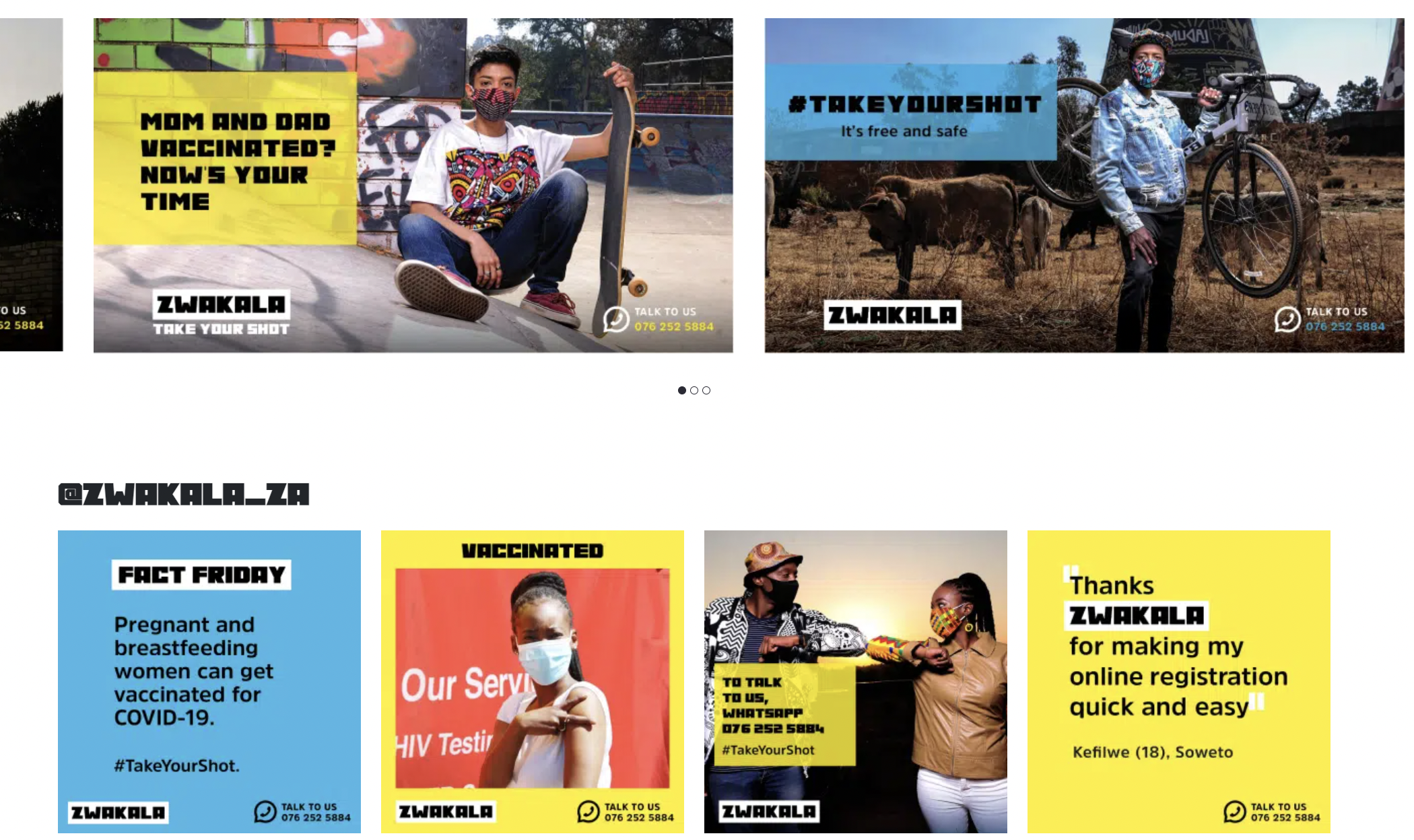 Zwakala Campaign/UN
Zwakala Campaign/UN
The hashtag campaigns counteract online misinformation that does not comply with UN narratives. Hashtag campaigns allow information to be aggregated and shared, with the potential for the information associated with them to go viral. For example, #PledgetoPause asks its information sharers to consider that "things we share online spread like wildfire, and a small share can have big consequences." #OnlyTogether was a specific marketing campaign tailored to ensure fair access to vaccines so that the world can "return to normal."
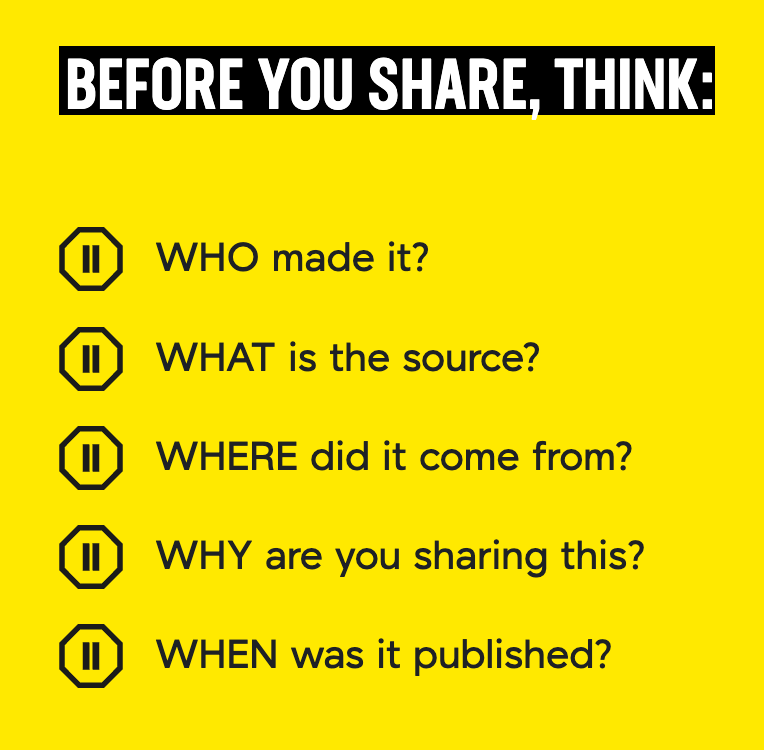 #PledgetoPause/UN
#PledgetoPause/UN
The #PledgetoPause landing page warns of the dangers of being misinformed on social media.
"For all its benefits, social media has become a vehicle for misinformation. Stories are skewed, quotes are misremembered, and facts are twisted. Misinformation is disrupting our politics, our economy, and our health. With the current pandemic, it can even be deadly. Misinformation is also making it harder to tackle the world's most pressing issues. The climate emergency, the COVID-19 pandemic, the struggle for racial justice—to find a solution, we need to work together."
The Verified initiative also offers scientific and medical "experts" with its Team Halo initiative. These experts are UN-approved. All have a robust social media presence. Team Halo "was established as part of the United Nations Verified initiative in partnership with Purpose and the Vaccine Confidence Project at the University of London's School of Hygiene and Tropical Medicine." The initiative is backed by Luminate, IKEA Foundation, Rockefeller Foundation, and Capgemini.
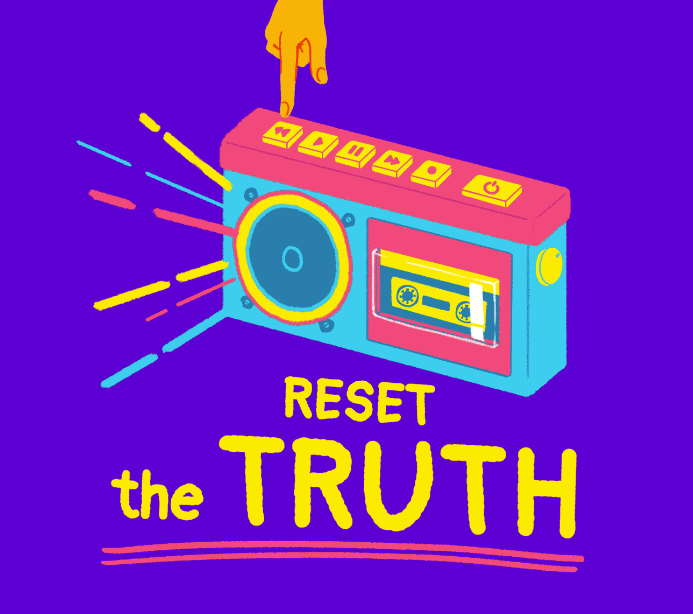 reset the truth/https://www.takecarebeforeyoushare.org/?pgid=kbwrv4z0-26fce1bd-1609-4486-84ed-d225d74ab58e
reset the truth/https://www.takecarebeforeyoushare.org/?pgid=kbwrv4z0-26fce1bd-1609-4486-84ed-d225d74ab58e
Apparently, an MIT study conducted in the UK and the U.S. found that #PledgetoPause "found that the simple act of pausing to question the origin, credibility, relevance, and accuracy of any information before sharing it on phones, computers, and social media platforms, significantly reduced people's propensity to share misinformation. In the study, participants who saw Pause Campaign content were notably less likely to share fake headlines." The Pause Campaign was created in collaboration with Purpose, a social impact agency, and was launched by UN Secretary-General António Guterres in May 2020.
Purpose is an extremely sophisticated social media marketing organization that uses innovative communication and marketing strategies that appeal to younger audiences to further "social impact" issues. Purpose helped build the Verified brand with the idea that "misinformation is a virus spread by people." The strategy? "To mobilize people to take action against it and to establish people-powered change." Purpose also developed a "Crush the Midterms campaign" through its Democracy Lab to "send Trump a message" in 2018.
The UN Report on Disinformation that Affects Human Rights and Fundamental Freedoms
Ilze Brands Kehris was appointed Assistant Secretary-General for Human Rights at the UN in January 2020. In November, Kehris presented the General Assembly with the Secretary-General's report, much of which addresses "the challenges posed by disinformation and the
responses to it." The report was written as a foundation for "countering disinformation for the promotion and protection of human rights and fundamental freedoms." The report also references a "legal framework" whereby "States have a duty to take appropriate steps to address these harmful impacts." Kehris proclaimed:
"Disinformation comes in different forms; this includes targeted operations by states, state officials, conspiracy-fed theories about health policies and vaccines, smear campaigns to undermine specific groups and persons, and many others.
Disinformation should not become a pretext to intimidate and harass critical voices, denigrate opponents, justify censorship, or obstruct the legitimate activities of human rights defenders and the media to access and disseminate information. Responses to disinformation should be grounded in respect for freedom of expression."
Embedded in the Secretary General's report is a footnote from the 2020 Broadband Commission for Sustainable Development report entitled "Countering Digital Disinformation While Respecting Freedom of Expression." The organization is another public/private partnership arrangement established in 2010 by UNESCO to "[foster] digital cooperation and [develop] actionable recommendations for achieving universal connectivity." I mention this footnoted study from the Broadband Commission because it is one of the foundational policy documents "reviewed for the present report"—the UN's report.
The Broadband report is an absolute treasure trove of information on third-party fact-checking activities, disinformation categorization schemes, legislative and policy responses, national and international counter-disinformation campaigns, and responses from internet communications companies on the international "Disinfodemic." The report serves as one of the foundational documents for the UN misinformation digital global program. The report is based on a study that "produced a framework for capturing the complete disinformation life cycle from instigation and creation to the means of propagation, to real-life impact, with reference to Instigators, Agents, Messages, Intermediaries, and Targets/Interpreters [which is] shortened to the acronym 'IAMIT'"
Just as strong advertising campaigns can affect consumer choices, so does carefully curated and repetitive messaging from governments and international organizations like the UN. For example, there is plenty of evidence to suggest that the persistent, fear-based messaging during the pandemic drove vaccine-related compliance. Such messaging is powerful and should not be underestimated in its ability to sway opinion and coerce behavior.


